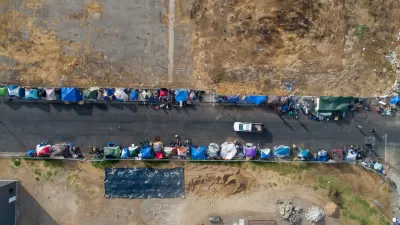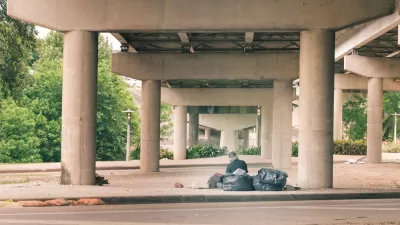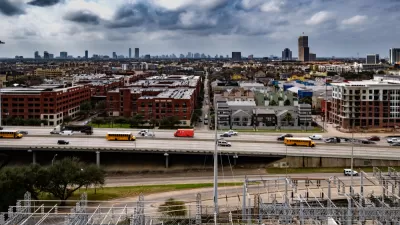Local housing advocates called for a commitment to bring the number of chronically unhoused people to zero.

At a recent town hall hosted by the Coalition for the Homeless of Houston/Harris County, local leaders asserted the potential for Houston to end chronic homelessness, writes John Brannen in The Kinder Institute for Urban Research’s Urban Edge.
According to Central Houston Inc. President and CEO Kris Larson, “This community has housed more than 3,000 people just in the last five years. This is a commitment issue that we need from our elected leadership to recognize that this is something we can do as a community.”
One of the few U.S. cities taking a ‘housing first’ approach to helping unhoused people find stable housing, Houston has been successful in part thanks to strong collaboration between agencies. The city experienced a 61 percent decrease in homelessness in the past 12 years, according to an annual point-in-time count, a success that, says Kinder Institute Director Ruth N. López Turley, shows that homelessness is “not an intractable problem.”
In a survey conducted this summer, housing affordability proved a serious concern for a majority of Houstonians. “Nearly 40% of Houstonians said they were ‘often’ or ‘almost always’ worried about being able to afford their monthly mortgage or rent payment, and about 1 in 4 renters said they were ‘often’ or ‘almost always’ worried about eviction.”
Editor's note: A previous version of this article and the source article quoted Kris Larson as saying "more than 300,000 people." The correct number is 3,000.
FULL STORY: Ending chronic homelessness remains a ‘moonshot’ opportunity for Houston

Planetizen Federal Action Tracker
A weekly monitor of how Trump’s orders and actions are impacting planners and planning in America.

Congressman Proposes Bill to Rename DC Metro “Trump Train”
The Make Autorail Great Again Act would withhold federal funding to the system until the Washington Metropolitan Area Transit Authority (WMATA), rebrands as the Washington Metropolitan Authority for Greater Access (WMAGA).

The Simple Legislative Tool Transforming Vacant Downtowns
In California, Michigan and Georgia, an easy win is bringing dollars — and delight — back to city centers.

The States Losing Rural Delivery Rooms at an Alarming Pace
In some states, as few as 9% of rural hospitals still deliver babies. As a result, rising pre-term births, no adequate pre-term care and harrowing close calls are a growing reality.

The Small South Asian Republic Going all in on EVs
Thanks to one simple policy change less than five years ago, 65% of new cars in this Himalayan country are now electric.

DC Backpedals on Bike Lane Protection, Swaps Barriers for Paint
Citing aesthetic concerns, the city is removing the concrete barriers and flexposts that once separated Arizona Avenue cyclists from motor vehicles.
Urban Design for Planners 1: Software Tools
This six-course series explores essential urban design concepts using open source software and equips planners with the tools they need to participate fully in the urban design process.
Planning for Universal Design
Learn the tools for implementing Universal Design in planning regulations.
Smith Gee Studio
City of Charlotte
City of Camden Redevelopment Agency
City of Astoria
Transportation Research & Education Center (TREC) at Portland State University
US High Speed Rail Association
City of Camden Redevelopment Agency
Municipality of Princeton (NJ)





























